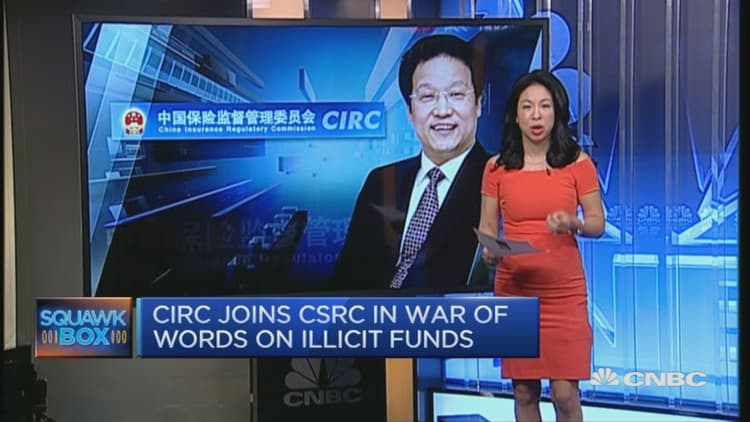"We will not allow you to challenge the bottom line of our regulations, tarnish the industry's image, or hurt the welfare of policyholders." Abide by the rules, or "otherwise, we will kick any miscreant out of the industry."
— Xiang Junbao, Chairman, China Insurance Regulatory Commission(CIRC)
Action always proves the true worth of words. In this case, the words of the Chinese insurance regulator barely survived a few hours.
Xiang talked tough at a Beijing press conference last week. The penalty against Foresea Life, which was announced immediately after his speech, proved otherwise.
It looked real on the surface. Foresea's chairman and owner Yao Zhenhua was barred from the industry for 10 years.
The regulator said Foresea's shareholders had used the insurer's own money for capital replenishment and it had falsified documents to keep its equity investment within regulatory cap.
More from the South China Morning Post:
The cat prevails over the mice in China's money mill, for now
What's in the short leash on China's insurers – risk or politics?
Why is Beijing declaring war on stock market 'crocodiles'?
State media called it the "heaviest" hit because it was always the general managers who took the whip, never the boss.
It is not.
Firstly, the suspension will hurt only if Yao is really the boss of Foresea.
Yet, anyone with a bit of China experience knows a business as juicy as life insurance will never land in the laps of a genuine private entrepreneur.
Yao was a little known vegetable hawker-turned-developer, when the regulator granted him the close-to-gold preparatory license in September 2011.

He then went on to do the impossible; getting the approvals to kick off the business in six months and set up four branches within a year.
If Yao was merely the money manager of a political heavyweight, suspending him is no big deal, as long as Foresea's shareholding is untouched.
Secondly, none of Forese's management team has been suspended, though the fraud could not have been happened without their involvement.
Neither was there any suggestion of criminal consequence for them, nor for Yao, for the forgery committed. In short, the operation remains intact.
Of course, business will be bad in the near term. The regulators have switched off Foresea's cash machine by suspending its sale of "universal insurance," which is not really insurance, but rather a high-yielding deposit scheme with guaranteed returns.
That's pushed its coverage ratio down by a fifth to 110 per cent. Yet, when did anyone ever see a mainland insurer go belly up? Even those with negative ratios don't.
The leniency is perhaps best explained by Foresea not only being "powerful," but also "good," until a change in political tides late last year.
Back in June 2014, Foresea had already caught the attention of the state media and the front line regulators with its fivefold growth of insurance premium to 70 billion yuan in one year.
The Shanghai Securities News published four reports questioning the risk in Foresea's ballooning universal insurance, and whether it had manipulated numbers to satisfy regulators.

The report said the insurer was under investigation. Yet, nothing happened. The media turned silent on Foresea.
In February 2015, instead of the much called for tightening, CIRC removed the 2.5 per cent cap of guaranteed return for universal insurance.
The fact is mainland regulators are no less asset-hungry than corporates. The higher the industry's size, the more say the regulator has. Unsurprisingly, the business went wild.
Last January, regulators allowed Foresea to double its registered capital to 8.5 billion yuan, to finance its rapid business expansion.
By July 2016, the insurers were called to their national service. As the A share market crashed by 30 per cent, CIRC lifted the insurers' investment ceiling in blue chip stocks by a quarter to 40 per cent.
While the big state-owned companies stayed aloof, various private insurers jumped into the charge.
Foresea and Yao accumulated enough shares to become the controlling shareholder of China Vanke, the country's largest developer, adding to their shareholdings in 40 other listed companies.
These accumulations were welcomed by Xiang.
"In the international markets, insurers have always been seen as important institutional investors," he said during a public occasion last March. "Chairman Liu (Shiyu of China Securities Regulatory Commission) should be quite happy about that."
Yes, everything was a merry party until the battle for Vanke became nasty and political, bringing in top-level intervention and cleaning up.
Now Xiang is belatedly talking about tightening the rules.
So, is Foresea the poster boy of China's insurance industry, or its scapegoat?
Commentary by Shirley Yam from the South China Morning Post.
For more insights from CNBC contributors, follow @CNBCopinion on Twitter.

